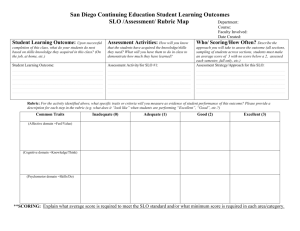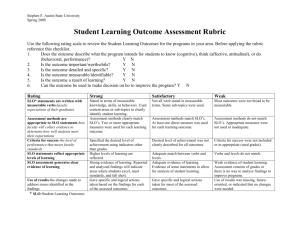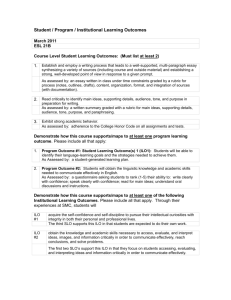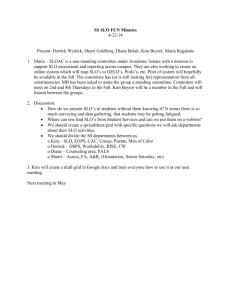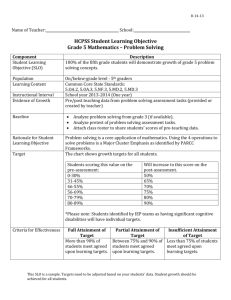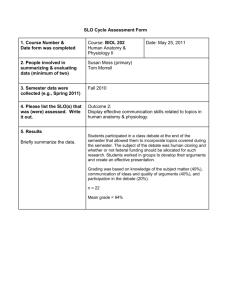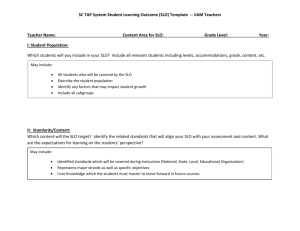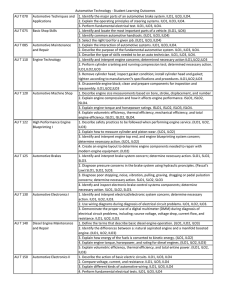BIOL220 SLO 1,4 F12 - Imperial Valley College
advertisement
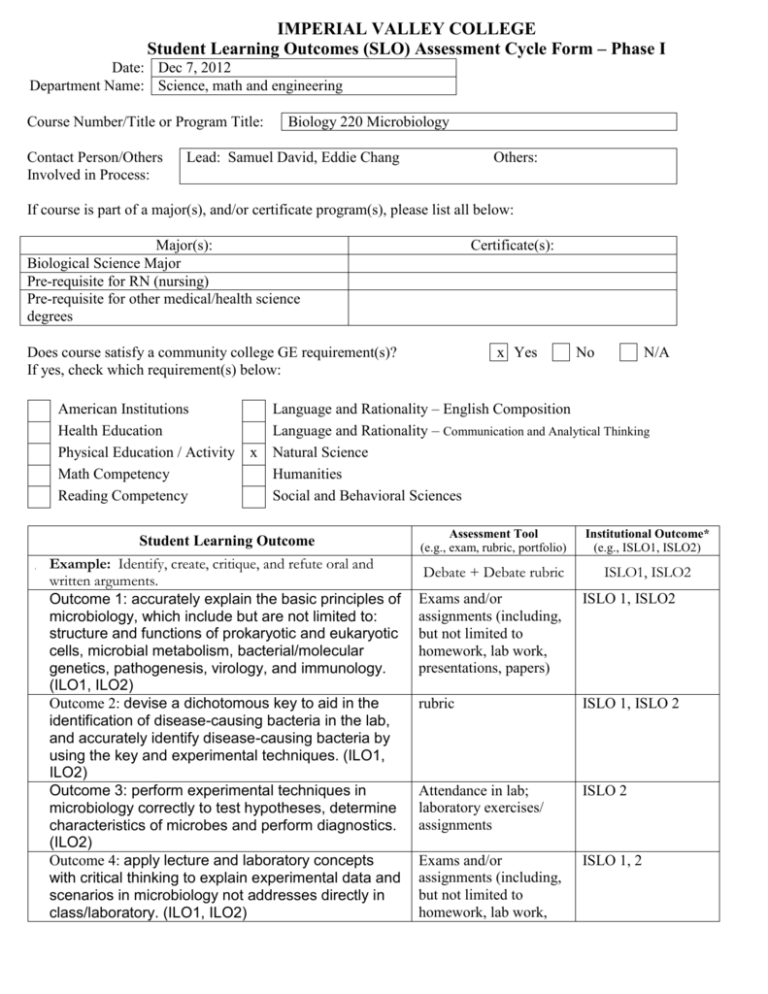
IMPERIAL VALLEY COLLEGE Student Learning Outcomes (SLO) Assessment Cycle Form – Phase I Date: Dec 7, 2012 Department Name: Science, math and engineering Course Number/Title or Program Title: Contact Person/Others Involved in Process: Biology 220 Microbiology Lead: Samuel David, Eddie Chang Others: If course is part of a major(s), and/or certificate program(s), please list all below: Major(s): Biological Science Major Pre-requisite for RN (nursing) Pre-requisite for other medical/health science degrees Certificate(s): Does course satisfy a community college GE requirement(s)? If yes, check which requirement(s) below: American Institutions Health Education Physical Education / Activity Math Competency Reading Competency x x Yes No N/A Language and Rationality – English Composition Language and Rationality – Communication and Analytical Thinking Natural Science Humanities Social and Behavioral Sciences Student Learning Outcome Example: Identify, create, critique, and refute oral and written arguments. Outcome 1: accurately explain the basic principles of microbiology, which include but are not limited to: structure and functions of prokaryotic and eukaryotic cells, microbial metabolism, bacterial/molecular genetics, pathogenesis, virology, and immunology. (ILO1, ILO2) Outcome 2: devise a dichotomous key to aid in the identification of disease-causing bacteria in the lab, and accurately identify disease-causing bacteria by using the key and experimental techniques. (ILO1, ILO2) Outcome 3: perform experimental techniques in microbiology correctly to test hypotheses, determine characteristics of microbes and perform diagnostics. (ILO2) Outcome 4: apply lecture and laboratory concepts with critical thinking to explain experimental data and scenarios in microbiology not addresses directly in class/laboratory. (ILO1, ILO2) Assessment Tool (e.g., exam, rubric, portfolio) Institutional Outcome* (e.g., ISLO1, ISLO2) Debate + Debate rubric ISLO1, ISLO2 Exams and/or assignments (including, but not limited to homework, lab work, presentations, papers) ISLO 1, ISLO2 rubric ISLO 1, ISLO 2 Attendance in lab; laboratory exercises/ assignments ISLO 2 Exams and/or assignments (including, but not limited to homework, lab work, ISLO 1, 2 presentations, papers) Outcome 5: fully participate in classroom and laboratory activities. (ILO3) Attendance in lecture and ISLO3 lab; in class discussion and assignments Each SLO should describe the knowledge, skills, and/or abilities students will have after successful completion of course or as a result of participation in activity/program. A minimum of one SLO is required per course/program. You may identify more than one SLO, but please note that you will need to collect and evaluate data for each SLO that you list above. Attach separate pages if needed. For assistance contact: Toni Pfister toni.pfister@imperial.edu or X6546 *Institutional Student Learning Outcomes: ISLO1 = communication skills; ISLO2 = critical thinking skills; ISLO3 = personal responsibility; ISLO4 = information literacy; ISLO5 = global awareness Student Learning Outcomes (SLO) Assessment Cycle Form – Phase II You may elaborate as much as you need to in order to complete this form. Instructions are on the following page. The ASSESSMENT CYCLE: Closing the Assessment Loop 1. Course Number & Date of Assessment Cycle Completion Course: bio 220 2. People involved in summarizing and evaluating data Eddie Chang and Samuel David 3. Data Results Outcomes 1 and 4 were assessed: Briefly summarize the results of the data you collected. 24 of 26 (92%) students were able to correctly describe the effect of different types of mutations on bacteria on an exam. This is a key concept in bacterial genetics. (outcome 1) Date: 12/7/12 17 of 26 students (65%) applied their knowledge to correctly describe a scenario not directly addressed in class. Students were asked on an exam to suggest how a gene which is expressed under specific conditions can be turned into one that is expressed at all times. While the class discussed the basic mechanisms of HOW gene expression is controlled, the class did not directly address how the timing of expression can be changed. In order to answer this question correctly, students have to understand the relationship between the basic mechanisms and mutation. If they are able to do so, they can then see the possibility that mutation can change these mechanisms. Hence this is a question which tests the students ability to understand connections between concepts and then apply these connections to help them explain scenarios not explicitly addressed in the lecture (outcome 4) 4. Course / Program Improvement Please describe what change(s) you plan to implement based on the above results. Give students more assignments and opportunities to refine their critical thinking skills, especially their ability to understand relationships between different concepts, so that more students (70% or greater) can achieve objective 4. *Will this include a change to the curriculum (i.e. course outline)? no 5. Next Year Was the process effective? Will you change the outcome/ assessment for next year? (e.g. alter the SLO, assessment, faculty discussion process, strategy for providing SLO to student)? If so, how? I believe the process is effective for these outcomes, since these outcomes can be objectively assessed. 6. After-Thoughts Feel free to celebrate, vent, or otherwise discuss the process. Not all outcomes can be objectively assessed. I feel that the process works less well for these outcomes. For example, I assessed outcome 5 for Spring 2012, which is less easily assessed by objective means. I feel that the assessment was too subjective. I believe there should be more guidance (including formal instruction) on how objectives can be devised so that they can be objectively assessed. 1. Please list the course number. In case page 1 is separated from page 2, this will help with organization. Please include the date that assessment cycle was fully completed. 2. To encourage collaboration and the sharing of ideas, each form must be completed by at least two people. If you are the only one teaching the course, you are encourage to share your data results and improvement methods with at least one other staff or faculty member. Please list the names of all faculty, staff, and students who were involved in summarizing or evaluating the data. These names may be the same or different than those on the original SLO ID form. 3. Your original data results, or your raw data, should be kept within your department for three years. At this time you do not need to submit the raw data, but please keep it for future quality control measures. Please summarize the data that you collected. You should include how well students scored on the assessment. You might also include: how many instructors submitted data(full-time, part-time); the type of data that was submitted (rubric scores, practical test results, etc); and, if appropriate, if a cross-section of classes (day, evening, online) were assessed. If a rubric was used, you might discuss the number of students who scored 1, 2, 3, or 4, for example, on the rubric. 4. This is an opportunity to have a rich discussion with others involved in education. Please describe any changes that can be made based on the data. Changes might be made to class activities, assignment instructions, topics taught in class, or the course outline of record, etc. You might include when the changes will be implemented and, if a comparison is to be made, when the next round of data will be collected (e.g. Fall 2009). Then, answer “Yes” or “No” to the curriculum question – no explanations required but please answer the question. 5. This may provide an opportunity to discuss what went well and what could be improved. If the SLO needs to be tweaked or more outcomes/assessments need to be included you might want to do that now while the information is fresh. This may allow faculty to modify SLO(s) for next year and be prepared to include them on next year’s syllabus. 6. Please share your thoughts, feelings, and ideas on IVC’s SLO process thus far. When completed, please forward to SLO Coordinator and the designee in your department. Thanks.
